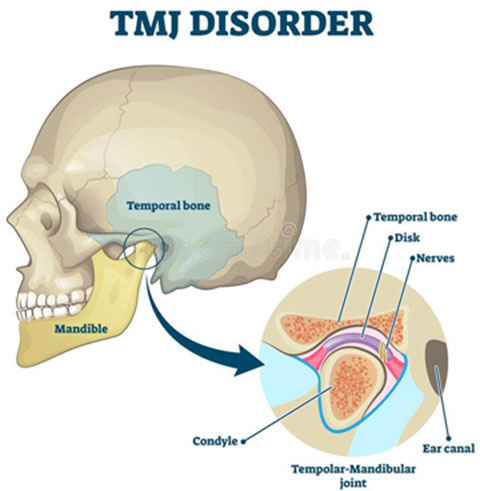What is TMJ?
Suffering from Temporomandibular Joint or TMJ condition is torturous. This happens when the temporomandibular joint is hindered owing to jaw or face muscle disorders.
Temporomandibular joint (TMJ) syndrome is a pain in the jaw joint that can be caused by various medical problems. The TMJ is connected to the lower jaw (mandible) to the skull (temporal bone) in front of the ear. The muscles on the face that control chewing are also connected to the lower jaw.
Experiencing TMJ? Read Our Helpful Articles:
- Managing TMJ Jaw Pain: The Do’s and Don’ts
- TMJ: Treat the Cause of Jaw Pain, Not the Symptoms
- How Do Dentists Find Out If You have TMJ in Doral?
- What is TMJ Treatment in Doral, Florida by Dr. Sonia Olivares
Three Types of TMJ
Overall, TMJ disorder is categorized into three main types which include:
- Myofascial Pain Disorder – This TMJ disorder can occur when pain and discomfort occur in the muscles around the jaw joint. The pain may be caused by abnormal muscle function, daily clenching, or nighttime grinding (bruxism).
- Internal Derangement of the Joint – This TMJ disorder can be a result of dislocated jaw, misaligned TMJ disc, or damage to the lower jaw. This is a skeletal symptom, not a muscular one. The articular disc inside the temporomandibular joint gradually slips or dislocates.
- Degenerative/Inflammatory Joint Disease – Joint degeneration and/or inflammation may occur as a result of excessive usage or aging. This condition might be caused by osteoarthritis, rheumatoid arthritis, or a ruptured TMJ disc.
A person may possess one or more of these conditions at the same time. These conditions are distinctly open to be more common in women than men. Trauma to the jaw or temporomandibular joint plays a bigger role in some TMJ disorders cause, but mostly the exact cause of the condition is not vivid.
For most people, symptoms seem to begin without a clear reason. Since TMJ is more common in women than in men, scientists are exploring a possible link between female hormones and TMJ disorders. Several symptoms may be connected to TMJ disorders like pain in the jaw joint or chewing muscles.
Some symptoms may differ for each person.
Signs and Symptoms of TMJ
If you are a TMJ patient, then symptoms such as chronic pain and tenderness in the face, jaw, neck and shoulders and in or around the ear are common. Other signs and symptoms are:
- Popping or clicking in the jaw
- Locked jaw, difficulty opening the mouth
- Pain when chewing, eating, or opening wide
- Frequent headaches or migraines and neck aches
- Chronic pain or Soreness or tiredness in the face or jaw
- Persistent neck or jaw discomfort
- New and unexplained tooth sensitivity
How Can a Dentist Like Dr. Sonia Olivares Deal With TMJ in Doral, FL?
Diagnosis of TMJ Disorder
Dr. Sonia Olivares diagnosed and identify the TMJ disorder of a patient by analyzing the symptoms and conducting a physical examination. Additionally, the following tests may be needed:
- A clench test
- X-rays
- CT scan or MRI scan
- A computer bite analysis test or a T-scan
- Joint vibration analysis
Treatment for TMJ Disorder
TMJ disorders are treated in a number of ways, ranging from conservative dentistry and medical therapy to complex surgery. In the short term, pain medication, muscular relaxation, appliance therapy with a bite plate or splint, and, if required, stress reduction counseling are all possible treatments.
If non-surgical therapy fails or if joint injury occurs, surgery may be necessary. Various types of surgery may be done to treat TMJ issues, including the following:
Arthrocentesis
Arthrocentesis is done by cleansing the joint by injecting the sterile fluid through the joint area. Additionally, the dental surgeon may use a blunt tool to remove any muscle adhesion bands and realign a disc that has been locked in the joint hinge in an inappropriate position.
Arthroscopy
The surgeon visually inspects the joint using an endoscope equipped with a camera and light. Your surgeon might be ale to remove adhesions, treat inflammatory tissue, or realign the disc.
Open-Joint Surgery
Open-joint surgery may be done in more severe situations to provide access to decaying bone, tumors, or scarred bone regions. The surgeon may remove or re-sculpt the damaged region using a knife. Open-joint surgery necessitates a longer recovery period and increases the risk of scarring or nerve damage.
Temporomandibular Joint Disorder Treatment by Dr. Sonia Olivares
Although TMJ disorder can be lead to a chronic illness, with correct diagnosis and treatment, it can be effectively treated. At iSmile, Dr. Sonia Olivares will help you with your TMJ condition. We can provide TMJ Treatments and solutions immediately.
To schedule your TMJ appointment, call iSmile Doral at (305) 620-8272, 8353 NW 36th St. Doral, FL 33166 and iSmile Coral Gables at (305) 396-1026, 2725 Ponce de Leon Blvd. Coral Gables, FL 33134.

